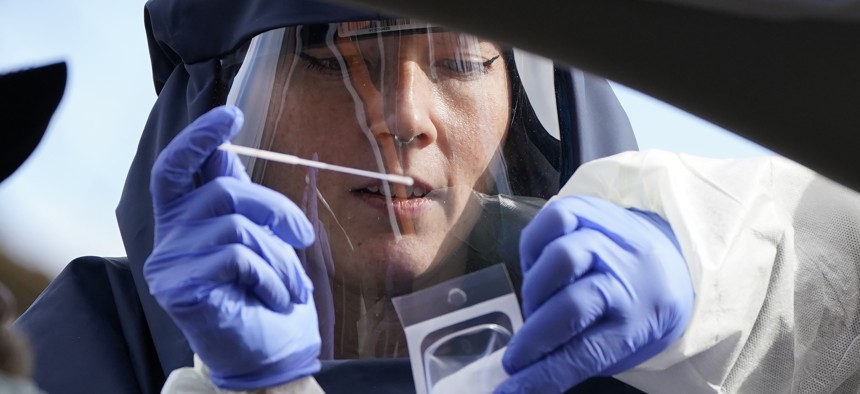County Leaders Urge Bipartisan Deal on Federal Covid Relief

A Salt Lake County Health Department public health nurse performs a coronavirus test at the Salt Lake County Health Department Friday, Nov. 13, 2020, in Salt Lake City. AP Photo/Rick Bowmer
“We continue to see too much politicization of a public health care crisis,” said Mark Poloncarz, the Democrat county executive of Erie County, New York, describing the logjam that has prevented additional funding for state and local governments.
County leaders from both sides of the political aisle said partisan politics at the federal level are harming their ability to respond to the coronavirus public health crisis.
In a call Monday hosted by the National Association of Counties, Republican and Democrat county leaders said they need more direct funding from the federal government and personal protective equipment this year to be able to continue providing essential services for residents and to respond to public health needs.
“This is not an issue related to politics, it’s an issue related to the public health,” said Mark Poloncarz, the Democrat county executive of Erie County, New York. “We continue to see too much politicization of a public health care crisis.”
The $2 trillion CARES Act, passed in March, provided $139 billion in direct funding to states and municipalities with more than 500,000 people. But Congress has been unable to agree on another aid package, with the inclusion of state and local government funding emerging as a key sticking point, as Senate Republicans in particular have questioned if it is necessary.
CARES Act funding must be spent by the end of December and enhanced federal unemployment benefits have largely run out—leaving local leaders concerned about what will happen if no supplemental aid package is approved before the end of the year.
Larry Johnson, a Democrat commissioner from DeKalb County, Georgia, outlined the needs on display in his county over the weekend. More than 2,500 people showed up to collect fresh fruit and vegetables at one local food bank and nearly 750 people had to be turned away, Johnson said. The county is currently spending $600,000 a month to help supplement food banks, which have seen increased demand during the pandemic.
Local governments have lost nearly 1 million jobs since the pandemic began, said Matthew Chase, NACO’s executive director. The CARES Act helped local governments preserve some public health workers, but once the federal funding dries up he expects job losses to spike.
County leaders say additional support will be necessary to help local governments distribute any forthcoming vaccines for the virus.
“County governments will be on the front lines of distributing vaccines and convincing residents to be vaccinated,” said Marcus Molinaro, the Republican county executive for Dutchess County, New York. “As a Republican, I speak to my friends in the United States Senate in particular—we need them to summon the political courage and will to provide the state and local assistance we need.”
Some congressional lawmakers have expressed skepticism of the need for additional financial assistance for local governments, noting that some have not spent the money they were allotted through the CARES Act.
In Kentucky, where some local governments have not spent all of the funding they received, the state is in the process of overseeing a “leveling process” what will redistribute the unspent funds to jurisdictions that have used up all of theirs, said Gary Moore, NACO’s president and the Republican judge/county executive of Boone County, Kentucky.
Erie County expects to spend every last penny it received, Poloncarz said.
Andrea Noble is a staff correspondent with Route Fifty.
NEXT STORY: States Need Federal Money to Do the Right Thing





